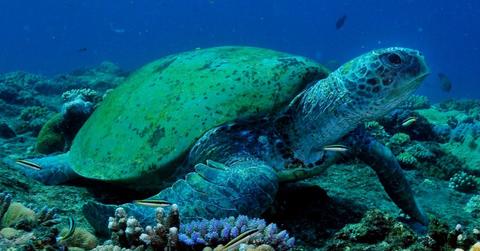Scientists Create Hybrid Coral To Combat Reef Destruction
As coral reefs continue to die off from increasing ocean temperatures, scientists like Professor Madeleine van Oppen are working to find solutions to save these crucial ocean organisms. Van Oppen and her team are helping restore coral reefs by researching an array of solutions such as genetic manipulations and bacteria administration.
Updated May 28 2019, 5:07 p.m. ET
Coral reefs are not only a beautiful cacophony of colors and textures, but these organisms also play a very crucial role in the ocean. While they cover less than 0.1 percent of the ocean’s surface, coral reefs are home to a large percentage of sea life. Corals grow by laying down their skeletons and can thrive because of algae that live in their tissue. This algae captures sunlight as an energy source and is an essential key to building reefs.
Yet, coral reefs are dying at an alarming rate. Their inability to adapt to the rapidly changing climate is threatening to disrupt the aquatic environment many marine organisms depend on. According to Professor Madeleine van Oppen, a senior researcher on coral reefs from the Australian Institute of Marine Science and the University of Melbourne, increased carbon dioxide in the environment during recent history has contributed to not only increased ocean temperature but also stronger, more frequent storms.
As the oceans heat up, the algae from the coral becomes damaged, and the coral loses its color and turns pale. The most famous area that has experienced this change is Australia’s Great Barrier Reef which lost half of its coral in just two years and has undergone substantial coral bleaching. The increased number of heavy storms also damages the reefs and scientists estimate that if nothing is done, coral reefs could be wiped out by 2050.
However, van Oppen is creating a solution to help oceans get ahead of the problem. She and her team are working towards coral reef restoration by finding ways to make the coral strong enough to cope with the rising global temperatures. To create coral that is resistant to environmental changes, she's focusing on a few approaches such as genetic manipulations to increase stress tolerance and probiotic administrations to improve health.
Van Oppen’s approach to producing improved coral stock is similar to how farmers improve crops and animals through careful selection and breeding. While this method does involve human-assisted evolution, van Oppen is not creating genetically modified organisms (GMOs) since no new genetically modified material is being introduced.
Instead, her team is using the technique of accelerating a naturally occurring evolutionary process so that a living organism, in this case coral, can better adapt to its changing environment. So far, it’s working. The experiments have successfully crossed different types of corals to create hybrids that can handle heat better and they are looking to test them in the Great Barrier Reef.
Her team is also trying to strengthen coral algae. By using beneficial bacteria as a probiotic remedy, they can help corals cope with stress before they start to bleach. This approach would allow scientists to help an established reef get out of trouble instead of having to create one from scratch every time a coral reef dies.
While creating stronger coral might help reefs stay ahead of extinction for a little while, it is not a permanent solution since the climate might continue to get hotter at faster speeds. Still, as the environment evolves, scientists are determined to buy the oceans some time.
